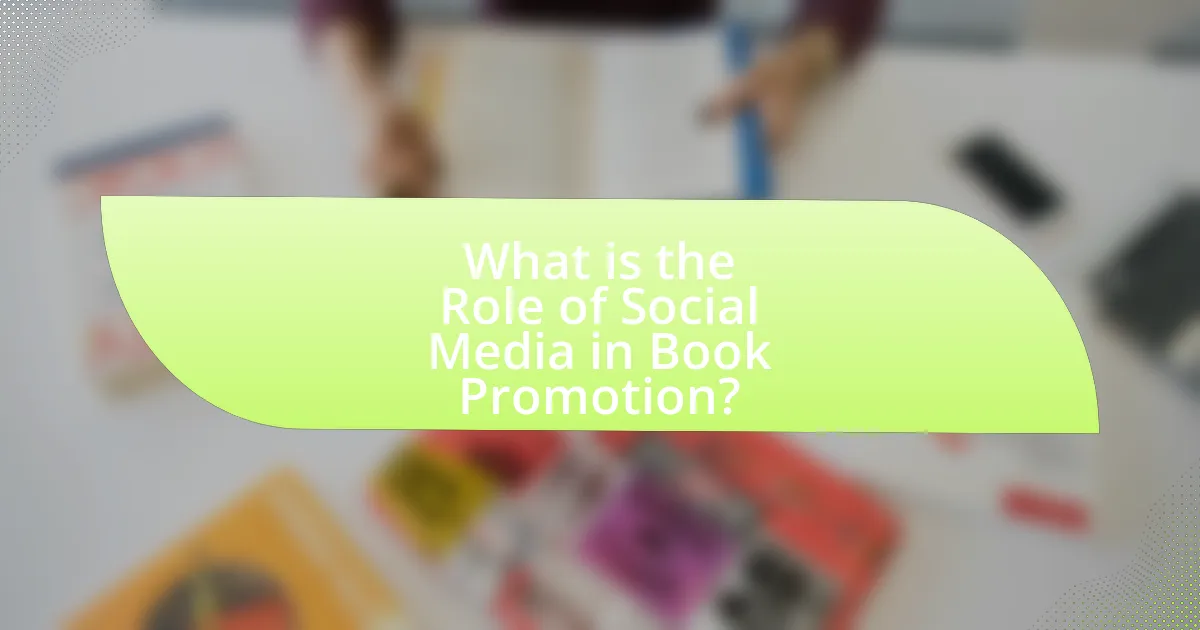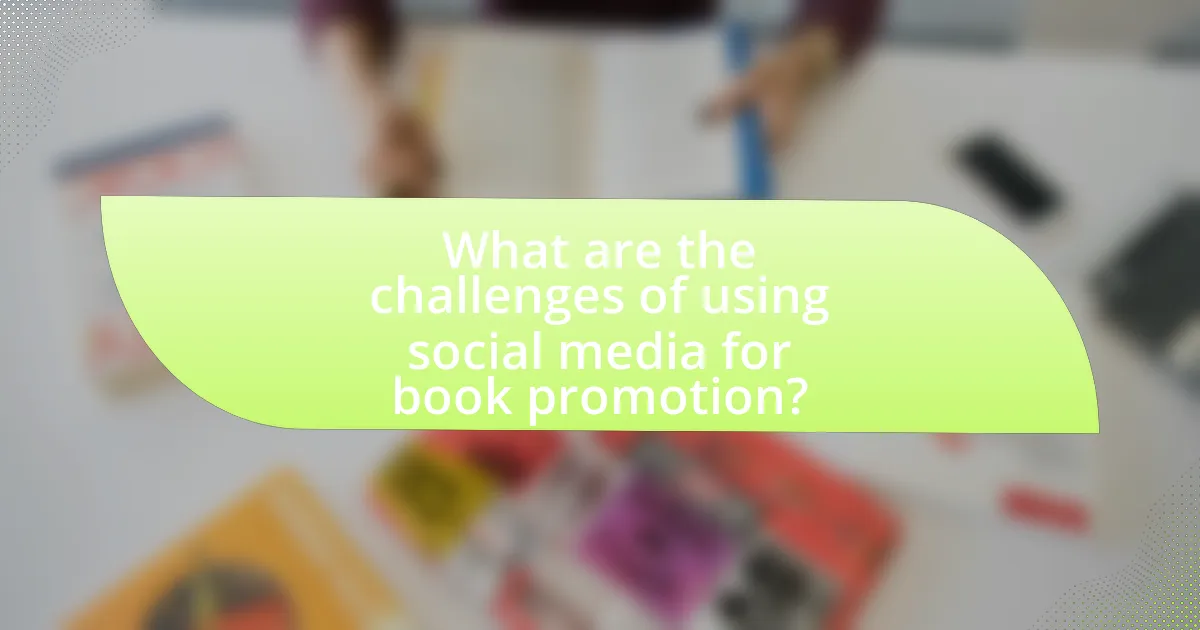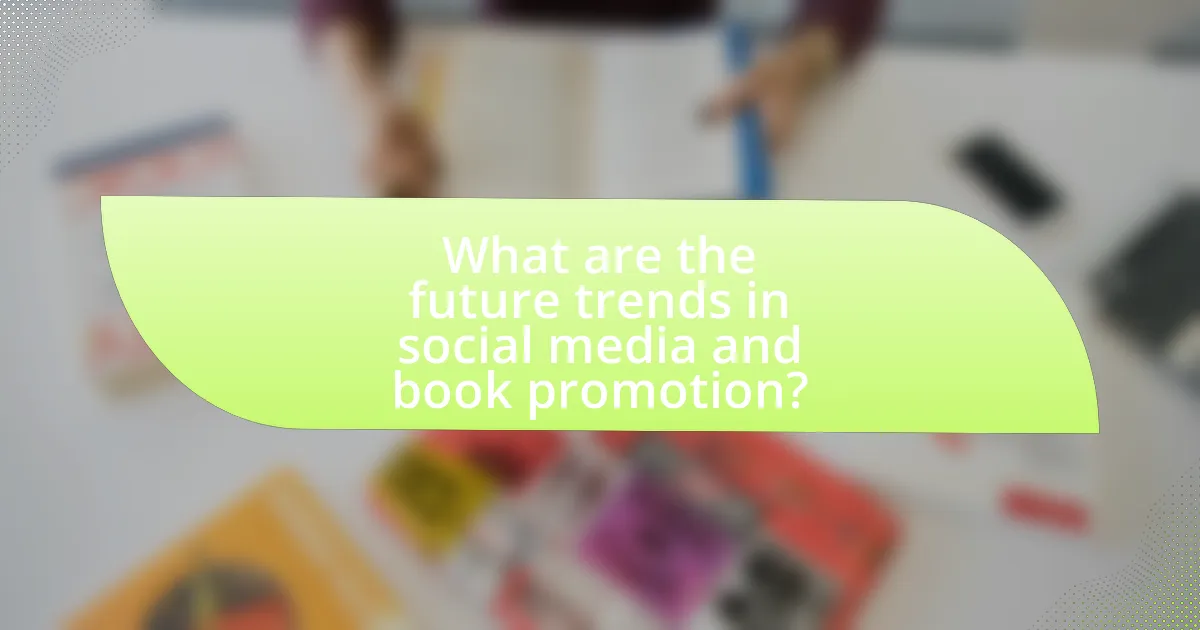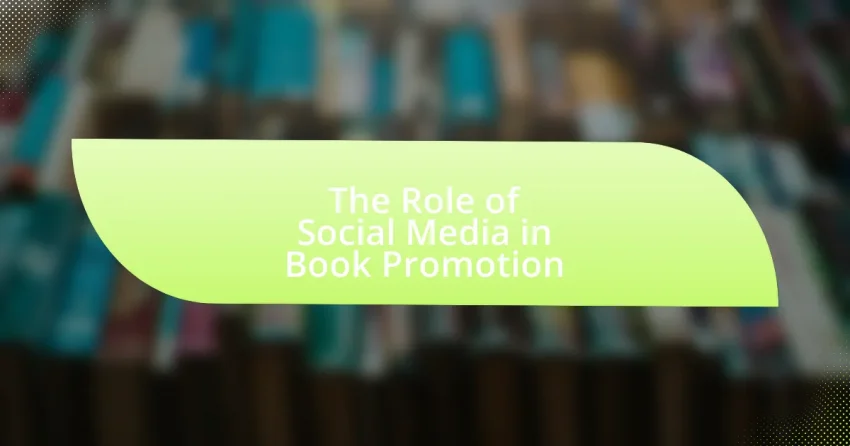The article focuses on the significant role of social media in book promotion, highlighting how platforms like Facebook, Instagram, Twitter, and TikTok enable authors and publishers to reach broader audiences and engage directly with readers. It discusses the transformation of traditional marketing methods through targeted advertising, real-time interaction, and the emergence of book influencers and online communities. Key strategies for effective promotion, the importance of understanding demographic engagement, and the challenges of oversaturation and negative feedback are also examined. Additionally, the article outlines best practices for authors to build a loyal following and measure the success of their promotional efforts on social media.

What is the Role of Social Media in Book Promotion?
Social media plays a crucial role in book promotion by providing authors and publishers with platforms to reach a wide audience, engage with readers, and build a community around their work. Through targeted advertising, authors can promote their books to specific demographics, increasing visibility and sales. For instance, a study by the Pew Research Center found that 69% of adults in the U.S. use social media, making it an effective channel for reaching potential readers. Additionally, social media allows for real-time interaction, enabling authors to receive immediate feedback and foster relationships with their audience, which can lead to increased word-of-mouth marketing.
How has social media changed the landscape of book promotion?
Social media has transformed book promotion by enabling authors and publishers to reach wider audiences directly and interactively. Platforms like Instagram, Twitter, and Facebook allow for targeted marketing strategies, where authors can engage with readers through posts, live sessions, and community-building activities. According to a 2021 survey by the American Marketing Association, 70% of authors reported that social media significantly increased their book sales, demonstrating its effectiveness as a promotional tool. Additionally, the rise of book influencers and online book clubs has created new avenues for organic promotion, further reshaping traditional marketing methods in the publishing industry.
What are the key social media platforms used for book promotion?
The key social media platforms used for book promotion are Facebook, Instagram, Twitter, and TikTok. Facebook allows authors to create pages and groups to engage with readers, while Instagram’s visual nature is effective for showcasing book covers and engaging content. Twitter facilitates real-time interactions and updates, making it suitable for connecting with readers and other authors. TikTok, particularly through the #BookTok trend, has rapidly gained popularity for its ability to create viral book recommendations and discussions. These platforms collectively provide diverse avenues for authors to reach and engage their target audience effectively.
How do different demographics engage with book promotions on social media?
Different demographics engage with book promotions on social media through varying platforms and content types that resonate with their preferences. For instance, younger audiences, particularly Millennials and Gen Z, predominantly utilize Instagram and TikTok, favoring visually appealing content such as book trailers and influencer recommendations. In contrast, older demographics, such as Baby Boomers, are more likely to engage on Facebook, where they respond positively to community discussions and author Q&A sessions.
Research indicates that 71% of younger users prefer visual content, while 60% of older users appreciate written posts and articles, highlighting the distinct engagement styles across age groups. Additionally, gender differences also play a role; women are more likely to engage with book clubs and reading challenges on social media, while men may prefer direct promotions and author interviews. This demographic variation underscores the importance of tailored marketing strategies in book promotions on social media platforms.
Why is social media important for authors and publishers?
Social media is important for authors and publishers because it provides a platform for direct engagement with readers, enhancing visibility and promoting books effectively. Authors can share updates, interact with their audience, and build a community around their work, which can lead to increased book sales. According to a survey by the Pew Research Center, 69% of adults in the U.S. use social media, making it a vital channel for reaching a broad audience. Additionally, social media allows for targeted advertising, enabling authors and publishers to reach specific demographics that are more likely to be interested in their books, thus optimizing marketing efforts.
What advantages does social media offer over traditional marketing methods?
Social media offers several advantages over traditional marketing methods, primarily through its ability to reach a larger audience at a lower cost. Unlike traditional marketing, which often relies on print, television, or radio ads that can be expensive and limited in reach, social media platforms allow for targeted advertising and organic reach to millions of users globally. For instance, a study by HubSpot found that social media marketing costs 62% less than traditional marketing methods while generating approximately three times as many leads. Additionally, social media enables real-time engagement and interaction with potential readers, fostering a community around a book and enhancing customer relationships. This immediacy and interactivity are not typically available in traditional marketing channels, making social media a more dynamic and effective tool for book promotion.
How does social media enhance author-reader interaction?
Social media enhances author-reader interaction by providing direct communication channels that facilitate engagement and feedback. Platforms like Twitter, Instagram, and Facebook allow authors to share updates, respond to reader inquiries, and participate in discussions, creating a sense of community. Research indicates that 70% of readers feel more connected to authors who actively engage with them on social media, fostering loyalty and encouraging word-of-mouth promotion. This interaction not only humanizes authors but also allows them to gather insights on reader preferences, ultimately influencing their writing and marketing strategies.
What strategies can be employed for effective book promotion on social media?
Effective book promotion on social media can be achieved through targeted content marketing, engaging visuals, and strategic partnerships. Authors and publishers should create compelling posts that highlight key themes, quotes, or visuals from the book to attract potential readers. Utilizing platforms like Instagram and TikTok, which favor visual content, can significantly enhance engagement; for instance, Instagram posts with images receive 650% higher engagement than text-only posts. Additionally, collaborating with influencers or book bloggers can expand reach, as their established audiences may be more likely to trust recommendations. Research indicates that 70% of consumers are influenced by social media when making purchasing decisions, underscoring the importance of a strong social media presence for book promotion.
How can authors create engaging content for their audience?
Authors can create engaging content for their audience by understanding their interests and preferences, then tailoring their messages accordingly. Research indicates that content that resonates with the audience’s emotions and experiences tends to generate higher engagement rates. For instance, a study by HubSpot found that personalized content can increase click-through rates by 14% and conversion rates by 10%. Additionally, incorporating storytelling elements, visuals, and interactive components can enhance engagement, as these elements capture attention and foster a connection with the audience. By consistently analyzing audience feedback and engagement metrics, authors can refine their content strategies to maintain relevance and interest.
What role do hashtags and trends play in book promotion?
Hashtags and trends play a crucial role in book promotion by increasing visibility and engagement on social media platforms. When authors and publishers use relevant hashtags, they can reach targeted audiences who are interested in specific genres or themes, thereby enhancing discoverability. For instance, a study by the Pew Research Center indicates that 69% of adults in the U.S. use social media, making it a vital space for book marketing. Additionally, trending topics can create opportunities for authors to join conversations, leveraging real-time engagement to promote their work effectively. This strategic use of hashtags and trends can lead to higher sales and a broader readership.

What are the challenges of using social media for book promotion?
The challenges of using social media for book promotion include oversaturation of content, algorithm changes, and audience engagement difficulties. Oversaturation occurs as countless authors and publishers compete for attention, making it hard for individual books to stand out. Algorithm changes on platforms like Facebook and Instagram can limit organic reach, requiring authors to invest in paid advertising to maintain visibility. Additionally, engaging an audience is challenging due to short attention spans and the need for consistent, high-quality content to foster meaningful interactions. These factors collectively hinder effective book promotion on social media platforms.
What common pitfalls should authors avoid when promoting their books on social media?
Authors should avoid over-promotion when promoting their books on social media. Excessive self-promotion can alienate potential readers, leading to decreased engagement and interest. According to a study by the Pew Research Center, 70% of social media users prefer content that is informative or entertaining rather than promotional. Additionally, authors should refrain from neglecting audience interaction; failing to respond to comments or messages can create a disconnect with followers, reducing the effectiveness of their promotional efforts. Engaging with the audience fosters community and encourages word-of-mouth promotion, which is crucial for book visibility.
How can negative feedback be managed on social media platforms?
Negative feedback on social media platforms can be managed by promptly addressing concerns, engaging with users, and providing solutions. Timely responses demonstrate that the author or publisher values reader opinions, which can mitigate the impact of negative comments. Engaging with users involves acknowledging their feedback, whether positive or negative, and fostering a dialogue that shows willingness to improve. Providing solutions, such as offering refunds or clarifications, can also help to resolve issues and restore trust. Research indicates that 70% of consumers are more likely to recommend a brand that responds to their feedback, highlighting the importance of active management in maintaining a positive online presence.
What are the risks of over-promotion on social media?
Over-promotion on social media can lead to audience fatigue, decreased engagement, and potential damage to brand reputation. When users are bombarded with excessive promotional content, they may become disinterested or annoyed, resulting in unfollows or negative feedback. Research indicates that 70% of consumers feel overwhelmed by the amount of promotional content they encounter online, which can lead to a decline in trust and loyalty towards the brand. Additionally, over-promotion can create a perception of insincerity, causing audiences to question the authenticity of the messages being conveyed.
How can authors measure the success of their social media promotion efforts?
Authors can measure the success of their social media promotion efforts by analyzing key performance indicators (KPIs) such as engagement rates, follower growth, and conversion rates. Engagement rates, which include likes, shares, and comments, indicate how well the audience interacts with the content, while follower growth reflects the expanding reach of the author’s brand. Conversion rates, which track the number of followers who take specific actions like purchasing a book or signing up for a newsletter, provide direct insight into the effectiveness of promotional strategies. According to a study by HubSpot, businesses that actively measure these metrics can improve their marketing ROI by up to 30%, demonstrating the importance of data-driven approaches in social media promotion.
What metrics are most important for evaluating social media engagement?
The most important metrics for evaluating social media engagement include likes, shares, comments, reach, and impressions. Likes indicate the level of approval or interest in a post, while shares reflect how often content is distributed by users, amplifying its reach. Comments provide qualitative insights into audience sentiment and engagement depth. Reach measures the total number of unique users who see the content, and impressions quantify how many times the content is displayed, regardless of clicks. These metrics collectively offer a comprehensive view of audience interaction and content effectiveness in social media strategies.
How can authors adjust their strategies based on performance data?
Authors can adjust their strategies based on performance data by analyzing metrics such as engagement rates, click-through rates, and conversion rates from their social media campaigns. By identifying which posts or promotional tactics yield the highest engagement, authors can refine their content to better resonate with their audience. For instance, if data shows that video content generates more shares than static images, authors can prioritize creating more video posts. Additionally, tracking audience demographics and preferences allows authors to tailor their messaging and target specific groups more effectively, leading to improved promotional outcomes. This data-driven approach is supported by studies indicating that targeted marketing can increase conversion rates by up to 50%.

What are the future trends in social media and book promotion?
Future trends in social media and book promotion include the rise of video content, increased use of artificial intelligence for targeted marketing, and the growing importance of community engagement. Video content, particularly short-form videos on platforms like TikTok and Instagram Reels, has proven effective in capturing audience attention, with 54% of consumers preferring video over other formats for brand communication. Artificial intelligence is enhancing personalization in marketing strategies, allowing authors and publishers to reach specific demographics more efficiently. Additionally, fostering community engagement through interactive content and live events is becoming crucial, as studies show that 70% of consumers are more likely to buy from brands that engage with them on social media. These trends indicate a shift towards more dynamic, personalized, and community-focused approaches in book promotion.
How is technology influencing the way books are promoted on social media?
Technology is significantly influencing the promotion of books on social media by enabling targeted advertising and data analytics. Social media platforms utilize algorithms that analyze user behavior, allowing publishers and authors to reach specific demographics effectively. For instance, Facebook and Instagram provide tools for targeted ads that can be customized based on interests, age, and location, which increases the likelihood of engagement with potential readers. Additionally, the use of analytics tools helps track the performance of promotional campaigns, providing insights into what content resonates with audiences. This data-driven approach enhances the efficiency of marketing strategies, leading to higher visibility and sales for books.
What emerging platforms should authors consider for future promotions?
Authors should consider platforms like TikTok, Instagram Reels, and Clubhouse for future promotions. TikTok has rapidly gained popularity, with over 1 billion active users, making it a powerful tool for reaching younger audiences through creative video content. Instagram Reels, with its focus on short, engaging videos, allows authors to showcase their work and connect with readers visually. Clubhouse offers a unique audio format where authors can engage in live discussions, creating a sense of community and direct interaction with potential readers. These platforms are increasingly influential in shaping consumer behavior and can significantly enhance an author’s promotional strategy.
How will changes in user behavior impact book promotion strategies?
Changes in user behavior will significantly impact book promotion strategies by necessitating a shift towards more personalized and interactive marketing approaches. As readers increasingly engage with content through social media platforms, book promotion strategies must adapt to leverage these channels effectively. For instance, data from the Pew Research Center indicates that 72% of adults use social media, highlighting the importance of targeted campaigns that resonate with specific audience segments. Consequently, authors and publishers will need to focus on creating engaging content, such as live Q&A sessions, interactive posts, and user-generated content, to foster community and enhance visibility. This shift towards a more dynamic and responsive promotional strategy is essential to meet the evolving preferences of readers in a digital landscape.
What best practices should authors follow for successful social media book promotion?
Authors should engage their audience consistently and authentically on social media for successful book promotion. This involves creating a content calendar to schedule regular posts, sharing behind-the-scenes insights about their writing process, and interacting with followers through comments and messages. Research indicates that consistent engagement can increase audience loyalty and visibility; for instance, a study by the Pew Research Center found that 69% of adults use social media, making it a vital platform for reaching potential readers. Additionally, authors should utilize targeted advertising on platforms like Facebook and Instagram, which can increase book visibility by reaching specific demographics interested in their genre.
How can authors build a loyal following on social media?
Authors can build a loyal following on social media by consistently engaging with their audience through authentic interactions and valuable content. Engaging with followers by responding to comments, asking for feedback, and sharing personal insights fosters a sense of community. Additionally, providing valuable content such as writing tips, behind-the-scenes looks at the writing process, and exclusive updates on upcoming works can enhance follower loyalty. Research indicates that 70% of consumers feel more connected to brands when the brand engages with them on social media, highlighting the importance of interaction in building loyalty.
What are effective ways to collaborate with influencers in book promotion?
Effective ways to collaborate with influencers in book promotion include establishing clear objectives, selecting the right influencers, and creating engaging content. Setting specific goals, such as increasing book sales or enhancing brand awareness, helps guide the collaboration. Choosing influencers whose audience aligns with the book’s target demographic ensures a more impactful reach. Additionally, crafting unique content, such as personalized reviews, giveaways, or live reading sessions, fosters genuine engagement and encourages followers to take action. Research indicates that influencer marketing can yield an ROI of up to 11 times the initial investment, highlighting its effectiveness in driving book promotion.
